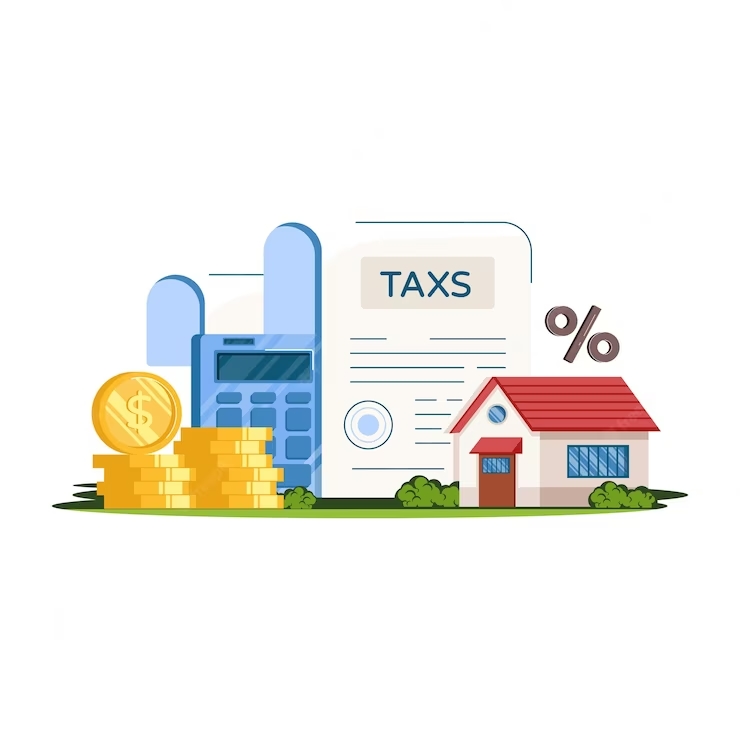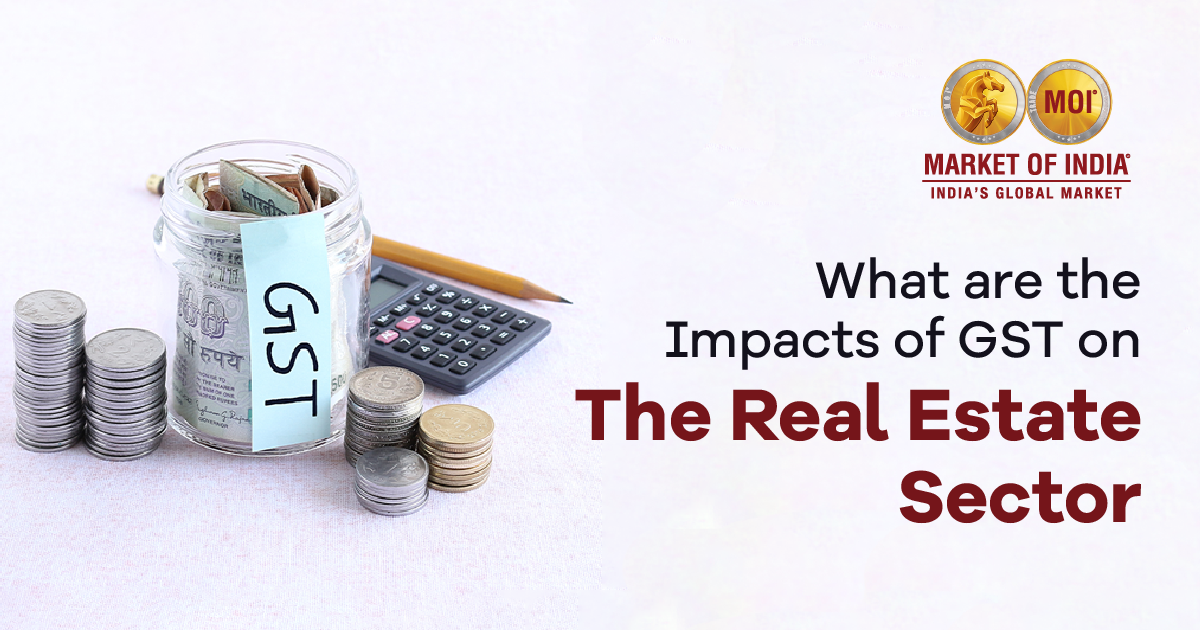Introduction
The Goods and Services Tax (GST) is a comprehensive indirect tax that took effect in India on July 1, 2017. It streamlined the tax structure and created a unified market across the country by replacing several indirect taxes levied by the federal and provincial governments. GST introduction has had a substantial influence on a variety of industries, including real estate.
Overview of GST in Real Estate

Historically, the real estate sector in India has been subject to a complex tax framework, with many taxes applied at various phases of building and property transactions. The Goods and Services Tax (GST) was implemented to streamline the tax structure and increase transparency, efficiency, and simplicity of doing business in the real estate market.
Furthermore, GST has increased transparency in the real estate business by reducing tax evasion and encouraging compliance. The simplified compliance procedures and uniform tax structure have made it easier for developers to operate and do business in the sector. Commercial assets, such as office spaces, shops, and shopping malls, are also liable to the 18% GST rate with ITC.
Positive Impacts of GST on Real Estate
- Enhanced transparency and reduced tax evasion: GST has increased transparency in the real estate business by eliminating the cascading effect of various taxes. It has replaced indirect taxes with a unified tax framework, such as VAT, service tax, and central excise. This has simplified the tax system and reduced the opportunity for tax evasion and corruption.
- Streamlined taxation, elimination of multiple taxes: By replacing various taxes with a single tax regime, GST has simplified the tax structure in the real estate sector. Previously, homebuyers were required to pay multiple taxes, including VAT, service tax, and stamp duty. With the implementation of GST, these levies were merged into a single comprehensive tax, decreasing the complexity and administrative cost for both buyers and developers.
- Cost savings for home buyers and investors: The implementation of GST has resulted in cost savings for real estate buyers and investors. Previously, developers had to pay different taxes on construction materials and services passed on to customers. The tax burden has been rationalised with GST, resulting in lower overall expenses. As a result, properties have become more affordable to purchasers, and investor confidence in the real estate market has increased.
- Elimination of double taxation: The GST has eliminated double taxes in the real estate sector. Previously, under-construction houses were subject to VAT and service tax, resulting in higher buyer tax burdens.
Negative Impacts of GST on Real Estate
- Possible increase in property prices: One of the concerns expressed in the real estate sector about GST is the possibility of an increase in property prices. Previously, developers could take advantage of tax breaks and deductions on construction goods and services. The tax burden has been rationalised with the advent of GST, and developers may pass on the additional costs to homebuyers. This could result in higher property prices, making it more difficult for potential purchasers to purchase homes.
- Compliance and administrative burdens for real estate businesses: Developers and builders must maintain proper records, submit regular returns, and adhere to strict compliance procedures. The increased administrative burden can be challenging, especially for small and medium-sized developers who may need more resources and infrastructure to manage the complexities of GST compliance.
- Impact on the resale market: Implementing GST has impacted the real estate resale market. The GST regime applies to under-construction properties, including resale homes, under the GST regime. As a result, the entire cost of such houses has risen, making them less appealing to buyers. As a result, the resale market has slowed, threatening the liquidity and
profitability of property owners trying to sell their apartments.
GST and Input Tax Credits in Real Estate

The Input Tax Credit (ITC) is a fundamental concept in the Goods and Services Tax (GST) system that allows businesses to claim credit for taxes already paid on inputs used in manufacturing or delivering goods and services. Companies can minimise their output tax burden by claiming ITC, effectively minimising the cascading tax effect.
Businesses could not claim credit for taxes paid on inputs under the pre-GST regime, resulting in a larger tax burden and increased costs. On the other hand, businesses can use ITC to balance the taxes paid on inputs against their output tax burden, ensuring that tax is only assessed on the value contributed at each level of the supply chain. It promotes transparency, efficiency, and fairness in the taxation system, benefiting businesses and consumers.
Significance of Input Tax Credit on Commercial Real Estate
- Cost savings: ITC for commercial areas reduce overall tax liability, saving firms money.
- Competitive advantage: Obtaining ITC allows firms to sell products or services at competitive pricing, giving them a competitive advantage.
- Financial flexibility: ITC savings can be used for business expansion, investment, or product/service quality improvement.
- Compliance and openness: The ITC urges enterprises to keep accurate records to promote accountability and transparency.
- Increasing occupancy rates: Commercial locations offering ITC benefits may appeal more to potential tenants.
Availability and Utilisation of ITC in the Real Estate Sector
- Real estate developers and builders can claim ITC for taxes paid on inputs used in the construction or development of under-construction properties.
- It can be claimed for taxes spent on building materials, services, and qualified construction-related expenses.
- To claim ITC in the real estate sector, proper paperwork, such as legitimate tax invoices and receipts, is required.
- GST paid on the purchase of land and immovable property cannot be claimed as an ITC.
- For claiming and utilising ITC in the real estate business, timely submission of GST returns and adherence to filing rules are critical.
Unveiling the Impact of GST on the Market of India
Explore how implementing Goods and Services Tax (GST) has influenced the real estate sector, including the commercial shops in the Market of India. Discover the changes in property prices, input tax credit, and transparency, and learn about the exceptional investment opportunities in the vibrant Market of India. Contact us at 7358111999 for more information on commercial investment options.
Wrapping Up
The introduction of the Goods and Services Tax (GST) and the availability of Input Tax Credit (ITC) have considerably influenced the real estate industry. The increased transparency and reduced tax evasion by GST have improved the industry’s overall integrity. The tax system has been streamlined due to streamlining and eliminating various levies, resulting in cost reductions for homebuyers and investors.
Furthermore, the availability and proper utilisation of ITC have contributed to reducing development costs, making properties more affordable and encouraging investment prospects. While GST and ITC have obstacles and regulatory obligations, the benefits outweigh the downsides, enabling a more transparent, efficient, and competitive real estate.
FAQs
1. How has the Goods and Services Tax (GST) promoted transparency in the real estate sector?
GST has established a standardised and unified tax structure, limiting the opportunity for tax avoidance and fostering more transaction transparency.
2. What taxes were replaced by GST in the real estate sector?
GST replaced several indirect taxes, including VAT, service tax, and central excise duty, simplifying the tax structure and removing the complications associated with several taxes.
3. How has the Goods and Services Tax (GST) affected property prices?
While the impact of GST on property prices varies, the simplified tax structure and availability of input tax credits (ITC) have the potential to cut building costs, which could translate into more reasonable property prices.
4. What impact would GST have on real estate developers and builders?
GST has changed the compliance requirements for developers and builders, forcing them to keep correct documentation and follow filing procedures. The existence of ITC, on the other hand, can lower their tax liability and increase cost efficiency.









0 Comments